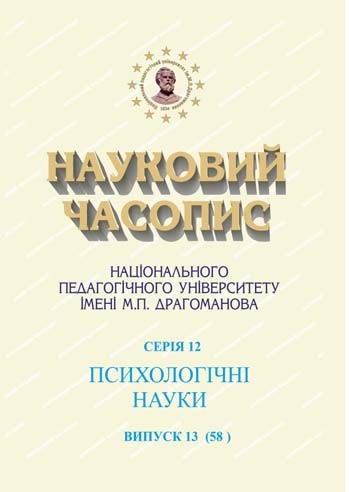POETIC PSYCHOTHERAPY AS A MEANS OF FACILITATION OF PERSONALITY SPIRITUAL TRANSFORMATION
DOI:
https://doi.org/10.31392/NPU-nc.series12.2021.13(58).04Keywords:
axiological psychology, bibliotherapy, spiritual transformation of personality, poetic psychotherapy, facilitation of personality developmentAbstract
Objective. The article considers the axiopsychological substantiation of the use of short-term poetic psychotherapy with the works of moral-ethical and existential-spiritual orientation. The aim of the study was descriptive-phenomenological and experimental-statistical proof of the poetry therapy effectiveness in the short term. The study objectives are to substantiate the feasibility of poetry application as a means of harmonizing current mental states and facilitating the prolonged processes of spiritual transformation of the individual; presentation of axiopsychological (subject-value) format of organization and content of poetry therapy; experimental and statistical verification of the effectiveness of the applied poetic therapy format.
Research methods: Spielberger and Y. Khanin scale of situational anxiety, G. Eisenko’s method of diagnostics of mental states, R. Eliot’s quality of life questionnaire; descriptive and statistical methods, correlation analysis. Formative experiment was conducted in the form of a poetic evening-training. 18 middle-class adults made up the experimental sample.
Results. As a result of the research it has been proved that in the process of poetry therapy there is a harmonization of current mental states and facilitation of personality spiritual transformation in accordance with axiopsychological format of selection and presentation of the author’s texts, determined by the principle on the organic, psychosomatic (relative subject); individual, adaptive-activity (monosubject); interactional, moral and communicative (polysubject); authentic cultural (metasubject); universal, transcendent (absolute subject) levels. The spiritual-transformational potential of poetry is proved to be determined by the intensity and severity of the moral dilemmas embodied in it, and in the near future it is manifested in the dynamics of psycho-emotional states represented at different levels of subjectivity of the recipient of poetry. Conclusions. There is a general tendency to increase the internal integration (harmonization) of mental states, which is a predictor of a mature life position, the strength of the self, the ability to reach an independent, authentic meaning of the individual. At the same time, the recipients of poetry positively re-evaluate the quality of their lives, which is accompanied by greater self-acceptance and assertiveness.
References
- Akoff, R., & Emeri, F.O. (1974). O tseleustremlennykh sistemakh [About purposeful systems]. In I.A. Ushakov (Ed.). Moscow : Sovetskoye radio [in Russian].
- Hulias, I.A. (2020). Aksiopsykholohichne proyektuvannya zhyttyevykh dosyahnen’ osobystosti [Axiopsychological design of life achievements of the personality]. Kyiv : Vydavnytstvo «Lyudmyla» [in Ukrainian].
- Zaika, V.M. (2006). Osoblyvosti transformatsiyi osobystosti lyudyny v khodi vyrishennya zhyttyevoyi kryzy. Metodychni materialy [Features of transformation of the person in the course of the decision of a life crisis. Methodical materials]. Poltava [in Ukrainian].
- Karpenko, Z.S. (1998). Aksiopsykholohiya osobystosti [Axiopsychology of personality]. Kyiv : TOV «Mizhnar. fin. ahentsiya» [in Ukrainian].
- Karpenko, Z.S. (2010). Naratyvnyy prostir terapiyi poeziyeyu: sub’yektno-tsinnisnyy pidkhid [The narrative space of poetry therapy: a subject-value approach]. Aktual’ni problemy praktychnoyi psykholohiyi: Zbirnyk naukovykh prats’ – Actual problems of practical psychology: Collection of scientific works, 10, 177–180 [in Ukrainian].
- Karpova, N.L., & Leytes, S. (2014). Bibliopsikhologiya i biblioterapiya v obrazovanii, vospitanii i korrektsiya [Bibliopsychology and bibliotherapy in education, upbringing and correction]. In N.L. Karpova (Ed.), Bibliopsikhologiya. Bibliopedagogika. Biblioterapiya – Bibliopsychology. Bibliopedagogy. Bibliotherapy (p. 175–180). Moscow : Russkaya shkol’naya bibliotechnaya assotsiatsiya [in Russian].
- Maklakov, A.G. (2001). Lichnostnyy adaptatsionnyy potentsial: yego mobilizatsiya i prognozirovaniye v ekstremal’nykh usloviyakh [Personal adaptive potential: its mobilization and forecasting in extreme conditions]. Psikhologicheskiy zhurnal – Psychological journal, 22(1), 16–24 [in Russian].
- Maksymenko, S.D., Kuzikova, S.B., & Zlyvkov, V.L. (Eds.). (2017). Osobystist’ yak sub’yekt podolannya kryzovykh sytuatsiy: psykholohichna teoriya i praktyka [Personality as a subject of overcoming crisis situations: psychological theory and practice]. Sumy: Vyd-vo SumDPU imeni A.S. Makarenka [in Ukrainian].
- Melik-Pashayev, A.A. (2014). Iskusstvo i zdorov’ye [Art and health]. In N.L. Karpova (Ed.), Bibliopsikhologiya. Bibliopedagogika. Biblioterapiya – Bibliopsychology. Bibliopedagogy. Bibliotherapy (p. 255–262). Moscow : Russkaya shkol’naya bibliotechnaya assotsiatsiya [in Russian].
- Onyshchenko, V.M. (2020). Transformatsiya osobystosti v protsesi podolannya zhyttyevykh kryz [Transformation of personality in the process of overcoming life crises]. Aktual’ni problemy psykholohiyi – Actual Problems of Psychology Scientific Papers of the G.S. Kostiuk Institute of Psychology Academy of Pedagogical Sciences of Ukraine, 1(56), 118–124 [in Ukrainian].
- Rubakin, N.A. (1977). Psikhologiya chitatelya i knigi. Kratkoye vvedeniye v bibliologicheskuyu psikhologíyu [Psychology of the reader and the book. A brief introduction to bibliological psychology]. Moscow : Kniga [in Russian].
- El’konin, D.B. (2001). Psikhologiya razvitiya [Developmental psychology]. Moscow : Izdatel’skiy Tsentr Akademiya [in Russian].
- Allen John, D., Carter, Karen, & Pearson, Mark. (2019). Frangible Emotion Becomes Tangible Expression: Poetry as Therapy with Adolescents. Australian Counselling Research Journal, 13(1), 14–19. Retrieved from https://www.acrjournal.com.au
- Daboui, P., Janbabai, G., & Siavash, M. (2018). Hope and mood improvement in women with breast cancer using group poetry therapy: A questionnaire-based before-after study. Journal of Poetry Therapy, 31(3), 165–172. doi: 10.1080/08893675.2018.1467822
- Hynes, A., & Hynes-Berry, M. (2011). Biblio/poetry therapy: The interactive process: Ahandbook. Saint Cloud, MI : North Star Press.
- Leedy, J.J., & Reiter, S. (2016). Poetry therapy. International Psychotherapy Institute. Retrieved from https://freepsychotherapybooks.org/product/907-Poetry_Therapy.
- Mazza, N. (2016). Poetry therapy: Theory and practice (2nd ed.). London: Routledge. Retrieved from https://www.taylorfrancis. com/books/9781317606994
- Muto, Takashi, Hayes Steven, C., & Jeffcoat, Tami. (2011). The Effectiveness of Acceptance and Commitment Therapy Bibliotherapy for Enhancing the Psychological Health of Japanese College Students Living Abroad. Behavior Therapy, 42(2), 323–335. Retrieved from https://doi.org/10.1016/j.beth.2010.08.009
- Xerri, D., & Xerri Agius, S. (2015). Galvanising empathy through poetry. English Journal, 104(4), 71–76. https://www.danielxerri.com/uploads/4/5/3/0/4530212/xerri_xerri_
agius_2015.pdf

